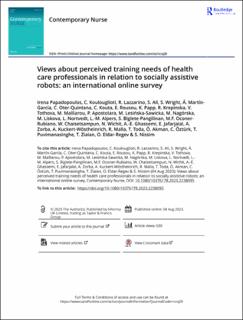| dc.contributor.author | Papadopoulos, Irena | |
| dc.contributor.author | Koulouglioti, C. | |
| dc.contributor.author | Lazzarino, R. | |
| dc.contributor.author | Ali, S. | |
| dc.contributor.author | Wright, S. | |
| dc.contributor.author | Martín-García, Á. | |
| dc.contributor.author | Oter-Quintana, C. | |
| dc.contributor.author | Kouta, C. | |
| dc.contributor.author | Rousou, E. | |
| dc.contributor.author | Papp, K. | |
| dc.contributor.author | Krepinska, R. | |
| dc.contributor.author | Tothova, V. | |
| dc.contributor.author | Malliarou, M. | |
| dc.contributor.author | Apostolara, P. | |
| dc.contributor.author | Lesińska-Sawicka, M. | |
| dc.contributor.author | Nagórska, M. | |
| dc.contributor.author | Liskova, M. | |
| dc.contributor.author | Nortvedt, Line | |
| dc.contributor.author | Alpers, Lise-Merete | |
| dc.contributor.author | Biglete-Pangilinan, S. | |
| dc.contributor.author | Oconer-Rubiano, M.F. | |
| dc.contributor.author | Chaisetsampun, W. | |
| dc.contributor.author | Ghassemi, A.-E. | |
| dc.contributor.author | Jafarjalal, E. | |
| dc.contributor.author | Zorba, A. | |
| dc.contributor.author | Kuckert-Wöstheinrich, A. | |
| dc.contributor.author | Malla, R. | |
| dc.contributor.author | Toda, T. | |
| dc.contributor.author | Wichit, N. | |
| dc.contributor.author | Akman, Ö. | |
| dc.contributor.author | Öztürk, C. | |
| dc.contributor.author | Puvimanasinghe, T. | |
| dc.contributor.author | Ziaian, T. | |
| dc.contributor.author | Eldar-Regev, O. | |
| dc.contributor.author | Nissim, S. | |
| dc.date.accessioned | 2023-11-23T07:00:50Z | |
| dc.date.available | 2023-11-23T07:00:50Z | |
| dc.date.created | 2023-10-06T12:14:43Z | |
| dc.date.issued | 2023 | |
| dc.identifier.citation | Contemporary Nurse: health care across the lifespan. 2023, . | en_US |
| dc.identifier.issn | 1037-6178 | |
| dc.identifier.uri | https://hdl.handle.net/11250/3104206 | |
| dc.description.abstract | Background: As Artificial Intelligence and social robots are increasingly used in health and social care,
it is imperative to explore the training needs of the workforce, factoring in their cultural background.
Objectives: Explore views on perceived training needs among professionals around the world and how
these related to country cultures.
Design: Cross-sectional, descriptive, mixed-methods international online survey.
Methods: Descriptive statistical analysis explored the ranking across countries and relationships with
three Hofstede cultural dimensions. Thematic analysis was conducted on the open-ended text
responses.
Results: A sample of N = 1284 participants from eighteen countries. Knowing the capabilities of the
robots was ranked as the top training need across all participating countries and this was also
reflected in the thematic analysis. Participants’ culture, expressed through three Hofstede’s
dimensions, revealed statistically significant ranking differences.
Conclusions: Future research should further explore other factors such as the level of digital maturity of
the workplace.
Impact Statement: Training needs of health and social care staff to use robotics are fast growing and
preparation should factor in patient safety and be based on the principles of person- and culture-
centred care. | en_US |
| dc.language.iso | eng | en_US |
| dc.rights | Attribution-NonCommercial-NoDerivatives 4.0 Internasjonal | * |
| dc.rights.uri | http://creativecommons.org/licenses/by-nc-nd/4.0/deed.no | * |
| dc.title | Views about perceived training needs of health care professionals in relation to socially assistive robots: an international online survey | en_US |
| dc.type | Peer reviewed | en_US |
| dc.type | Journal article | en_US |
| dc.description.version | publishedVersion | en_US |
| cristin.ispublished | true | |
| cristin.fulltext | original | |
| cristin.qualitycode | 1 | |
| dc.identifier.doi | 10.1080/10376178.2023.2238095 | |
| dc.identifier.cristin | 2182415 | |
| dc.source.journal | Contemporary Nurse: health care across the lifespan | en_US |
| dc.source.pagenumber | 0 | en_US |

